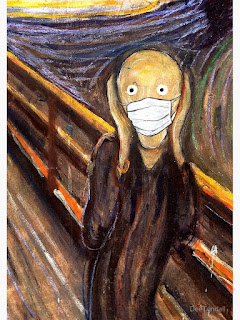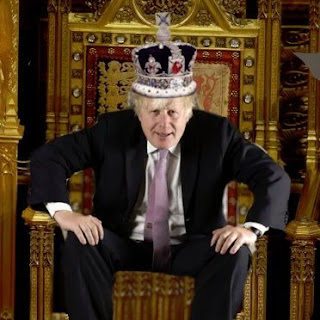As the ancient proverb says:
Never let a monkey sneeze in your face, or a shark walk up behind you ...
I.
Steven Salzberg published a very interesting piece in the American business magazine Forbes earlier this month [1], detailing how scientists in the United States and Canada involved in so-called gain-of-function research [2] have recreated the deadly 1918 flu virus (commonly known as Spanish flu).
Yes, you read that correctly; scientists have genetically recreated (and enhanced) an extinct flu virus [3]; one that killed tens of millions of people around the world in what was the second deadliest pandemic in human history (topped only by the Black Death in the mid-14th century). And they are now busy infecting captive monkeys with it ...!
I would have thought that was quite a controversial thing to do and would have therefore made for a big news story. But it's barely been reported in the mainstream media - despite all their hysteria over Covid-19 (and all we've learnt over the past few years about the very real risk of lab leaks).
II.
A story which did get quite a lot of media coverage, however, was one concerning a small species of longtailed, slender-bodied carpet shark, that is found in shallow, tropical waters off Australia and New Guinea [4].
Known as the epaulette shark, it has evolved to cope with the severe oxygen depletion in
isolated tidal pools by increasing the blood supply to its brain and
selectively shutting down non-essential functions. It can pretty much go
without oxygen for up to two hours, without suffering any ill effects.
Even more amazingly, epaulette sharks are also able to "walk" on dry land - again for a considerable period of time and covering a distance of up to 30 metres - by wriggling their bodies and pushing with their paddle-shaped fins. Researchers think this will radically improve their chances of survival in an increasingly challenging environment.
For whereas their competitors for food and better oxygenated water can only rely on their swimming abilities - and must stay submerged in order to breathe - these little sharks can happily stroll from tidepool to tidepool.
I love stories like this: for one thing, they present a serious challenge to creationists who deny evolution by natural selection; and, secondly, they also challenge the green doom-mongering of eco-fanatics who insist global warming will spell the end of life on earth: it won't.
Indeed, it could even be that, one day, in a far-off future, any remaining human beings not killed by ALZ-113 in the catastrophic Simian Flu Pandemic [5], will be hunted as prey not just by gorillas on horseback, but land-loving sharks able not merely to walk but run.
Notes
[1] Steven Salzburg, 'Scientists Have Re-Created The Deadly 1918 Flu Virus. Why?', Forbes (Aug 15, 2022): click here to read the article online.
[2] Gain-of-function research is the genetic enhancement of an organism such as a virus, in order to increase its transmissibility, for example, it's host range, or its deadliness. It's a form of research that therefore excites the interest of medical professionals hoping to better predict the behaviour of infectious diseases and better able to develop vaccines, and military chiefs concerned about (or keen to experiment with) bioweapons. Whilst not all GoF research is inherently dangerous, work on certain pathogens does have extremely worrying biosafety and biosecurity risks; that's why the United States, for example, is thought to outsource much of this work to labs in China (such as the Wuhan Institute of Virology).
[3] As Salzburg is at pains to point out: "The 1918 flu disappeared from the natural world long ago - or to be more
precise, it evolved into a much, much milder form of influenza. The
deadly form that was recently re-created in several labs does not exist
in nature today."
The threat that it now poses is entirely due to the work carried out by scientists over the last twenty years or so, based upon the original research of a team led by Jeffery Taubenberger and Ann Reid, who, having recovered pieces of the 1918 flu virus from human samples that had been frozen for nearly a century, figured out how to sequence the genome.
[4] See Richard Luscombe's article in The Guardian, for example; 'Epaulette sharks able to walk on land evolving to better survive climate crisis', (23 August, 2022): click here to read online.
[5] I'm referring here, of course, to the fictional flu pandemic which resulted in the near extinction of humanity in the American sci-fi movie Rise of the Planet of the Apes (dir. by Rupert Wyatt, 2011).
.jpg)














